

This is a summary of a trip I took through China with my wife, Wen (a.k.a. Gu Wen Yuan). Wen was born in Canton, but moved to the Beijing Central Conservatory at age 10. Her family is still in Canton. This page is both a narrative of our journey and more general commentary on China and the places we visited.
It was a fantastic trip. I understand China much better now (including its people, culture, and language). But now that we're back in Houston, it seems like a long dream. I'm happy to be back in a world were cars are taken for granted and both hot water and drinkable water come out of most every faucet.
Our first stop in China was Hong Kong (it seems so long ago). We stayed there one night in a ``guest house'' which is a kind of mini-hotel with very cheap, very small rooms. We walked around on the streets of the shopping district in Kowloon, and then got on an afternoon train to Canton. We didn't see much of Hong Kong, and I didn't really enjoy it; we just seemed to be in some sort of oversized Chinatown.
After we got off the train in Canton (and passed through immigration and customs), we were met by Wen's dad's youngest brother (which we call ``Youngest Uncle''). He rushed us out the door, through a mass of people outside the train station (I now know that the same mass of people can be found outside any train station in China), and into a small van. The driver took us through the city in rush hour traffic, driving as if he were in a movie chase scene, weaving through pedestrians, bicycles, and other cars.
We arrived in White Cloud Mountain (Bai2 Yun2 Shan1), a suburb of Canton and home of the Foreign Language Institute where Wen's grandfather used to teach. They still live on the walled-in campus (everything in China has a wall around it), in a house that looks like it was preserved from the 1930's. (In fact, it wasn't even built until the 50's.) That is were we lived for most of the trip. It's a relatively clean, pleasant community. It isn't that far into the city, but - transportation being what it is in China - it takes about 30 minutes by bus or car.

Grandma's house in White Cloud Mountain. Note the red
circular stamp (in this case indicating house #29) which is
the ubiquitous indicator of government administration.
During our stay in Canton, we met many relatives; this gave me the opportunity to see the insides of many homes. Of course, everyone in the city lives in an apartment, and all apartments look about the same from the outside: gray, dirty concrete. But once you get behind the steel gate of someone's front door, you can find the same variety of interiors that you would find in the U.S. Chinese families are now allowed to purchase their apartments and renovate them in any way, so that the home of a wealthy individual can be decorated quite nicely and comfortably (in stark contrast to the building's exterior).
Wen and her aunt Hsiao Mei (who is also a violinist) gave two concerts of chamber music in and around Canton. The concerts were very successful in consolidating Gu family prestige, and even made a small profit. As a result of the prestige, I ate dinner with some local political figures, including a Communist party official. Although the economy can hardly be called communist these days, Hsiao Mei's husband Leonid - who is originally from Moscow - immediately recognized a familiar communist air to the procedings.
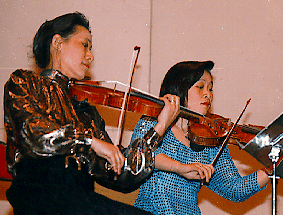
Hsiao Mei and Wen in concert.
We went into the city often. The city itself is not large: if Canton were located on Pittsburgh's site, most of the people and businesses would be in the triangle, extending to CMU, or so. That's about 2 million people (and 1 million bicycles).
Crossing the street was a terrifying experience at first, but I got used to it quickly. Sidewalks are obstacle courses with people, vendors, and bicycles. Some streets are barely wide enough for cars. There is no distinction between residential and commercial districts.
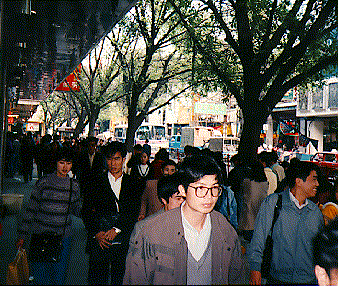
On Beijing Street in Canton.
No one wants to move out of the city, but the government is forcing them to move, because new buildings have to be built. Canton is being systematically rebuilt from scratch - everything is under construction. Construction there sometimes involves one bulldozer, but mostly it's manpower that builds everything. Looking at the construction methods (and some of the buildings which are apparently only a few years old), I wonder if they won't have to build everything again in a few years.
Despite the construction, few roads are being widened. Traffic in Canton is always bad. The streets are narrow, crowded, and chaotic. Traffic lights are rare, and the ones present are often ignored. Policemen direct traffic during rush hour.
There are a lot of buses and taxis, so it isn't too hard to get places if you have enough time. It is very expensive to obtain a driver's license - to say nothing of buying a car! - so people and businesses who need a car typically a hire professional, full-time driver. ``Full-time'' really means ``all the time'': even business drivers are likely to be enlisted by their boss for personal needs, and it's all part of the job.
Everything is cheap in China. Although foreigners are charged more whenever possible (especially in Canton, which has the fewest foreigners and is the most unfriendly place for foreigners), most food stores and large stores have reliable posted prices.
You can go to China on your own, stay in western hotels, get tour guides to help you visit the city, and let the hotel take care of buying your travel tickets. That would be about as expensive as a comparable trip to Europe, and you would have little idea about how Chinese people live. But if you want to live cheap, like the Chinese, you can't do it yourself. Getting places and getting things requires connections. Wen's family and friends, especially Youngest Uncle, have conections and it made our trip very enjoyable.
The exchange rate makes Americans quite rich. For example, the bus from White Cloud Mountain to Canton city costs 1.5 yuan per person. Converted to U.S. dollars at the present exchange rate, that's about 18 cents. A taxi into the city might cost 40 yuan (if you're Cantonese! Drivers would usually try to charge us more, say 80 yuan.) A nice meal for 4 people is around 120 yuan, or about $15. But 1 yuan to a Chinese person is (on average) about the same as 50-75 cents to an American (my estimate).
Small-business capitalism is thriving in China. The competition there often seems much purer than it is here. Coke, for example, costs 3 yuan everywhere in Canton: no small shop can afford to charge more than the small shop next door.
Canton is one of the more expensive cities, and everyone talks about how much more expensive things have become in the last two years. Inflation was eveident from bus and tax fare hikes that occurred during our stay. (By the time we left, bus fare into town was 2 yuan per person.)
The food in China - especially Canton - is fantastic. Everywhere we went, someone wanted to take us to dinner. We went to many of the best restaraunts in every city. I ate only Chinese food for a month. I don't particularly like rice, but I had to learn to eat more rice while I was there. I ate things which I normally wouldn't, including rabbit, frog, pigeon, snake, and dog. I always liked the snake, since it was prepared with a spicy Thai-style seasoning.
I learned to speak much better during the first two weeks of our trip. Still, I didn't learn as much as I wanted to. Most people that we met spoke English; Wen's grandfather was a Shakespeare professor, her gradmother learned English in college, Youngest Uncle has spent time in Australia, and all the kids in China are learning English. When people weren't speaking English, they often spoke Cantonese (which I do not understand), but fortunately most people in White Cloud Mountain use Mandarin (since most of the university people are from somewhere else).
After living in Canton for two weeks, we flew to Beijing (for about $200 per person; it's $100 for Chinese). We were tourists there, helped (as usual) by local friends. We saw the Great Wall (cold in December!), the Forbidden City, the Summer Palace, etc. My favorite stop was the Summer Palace. Of course, everything requires a ticket, and foreigners are charged 2-5 times as much as Chinese.
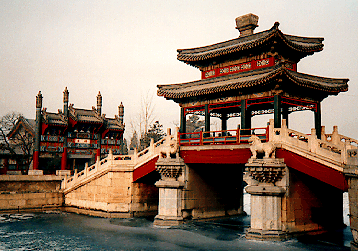
A typical bridge in the Summer Palace.
Individuals in Beijing are typically much friendlier than in Canton. Maybe it was because of the cold, or maybe it was because the streets were so much wider, but there didn't seem to be nearly so many people as in Canton. Soldiers and policemen are everywhere, though. The town as a whole as a very organized, governmental atmosphere.
From the airport to the main part of town (``Long Peace Road''), Beijing looks as modern as any city. In fact, it is quite a bit more modern than Canton at the present. But if you stray from this ``official'' path, then you see a city more like any other in China: lots of people crowded together in old dilapidated houses.
Despite resonably organized roads, traffic is usually bad in Beijing. It is apparently much easier to obtain a driver's license in Beijing, but the high cost of cars means that few people drive, anyway. Instead, people take a kind of taxi called a ``loaf of bread car''. These are basically Chinese-built mini-vans, with an emphasis on ``mini''. They're quite cheap for medium-length trips: 10 yuan will get you up to 10 km.
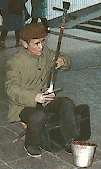
A musician in a Beijing underpass. We had passed many mediocre
musicians already, and were about to pass this one, until he
started playing.
We spent two days in Beijing visting friends and family. One friend took us to a kind of art-and-artifact flea market where we bought reasonable artworks at ridiculously low prices. The friends also got us Chinese-priced train tickets to Shanghai.
The train ride (17 hours) was pleasant. We were lucky top have a six-bed sleeping compantment to ourselves. The conductor didn't question me about being in a Chinese-price car. Perhaps, with my backpack, I looked like a student. Perhaps she didn't care.
Between Beijing and Shanghai, it's farmland all the way. (I think everything in China is either a farm, a city, or a trash heap.) Farms are more populous in China than here, and crops are planted in much smaller plots (since there are no machines on the farm). There are very few paved roads outside of the cities.
Shanghai is a great city, and very friendly to foreigners (there are more foreigners there than anywhere). Traffic is good - drivers even obey the traffic lights! Downtown is very much like any western city, and the waterfront is very nice.

This is us (Wen and Matthew) in
Shanghai. The antenna tower in the background is supposed to be the
tallest in Southeast Asia, but someone will probably build a taller one
next week.
(Click on the picture for a bigger version.)
Strangely, people often stared at me in Shanghai, which didn't happen anywhere else. Wen suspects this was because I kept wearing the P.L.A.-style (army) coat that I bought in Beijing. (Many people wear those coats in Beijing, because they're heavy and cheap.) Perhaps they were trying to determine if Wen - dressed in casual American clothes and a hat - was native Chinese or foreign.
We stayed in a guest house on the edge of town, about 1/2 mile deep into a neighborhood of narrow streets. It was not particularly cheap, it was cold, and the ``bathroom'' was three blocks away. It was certainly the kind of place where most Shanghaiese live, but by this time, I was ready for American conveniences.
When we arrived in Shanghai, we found out that the train to Canton takes 33 hours. Even though Canton is just as close as Beijing, there is no express train. So we bought plane tickets (for about $100 each). Taking a plane is about the only easy thing in China (and that is a very recent change).
We stayed in Canton for another week, and then took an overnight boat back to Hong Kong to start the journey home. In Hong Kong, friends took us to see more of the city, and I was much more impressed this time. Hong Kong is an expensive place, but these were rich friends and we finished our stay in China with some of the best food ever.
We bought lots of stuff in China, and everyone gave us gifts. We returned with twice as much stuff as we left with. Fortunately, two of the gifts were suitcases.
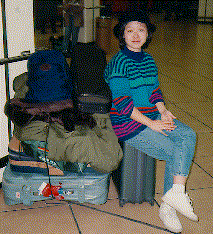
As pretty as an airport.
Two years later, we went back.